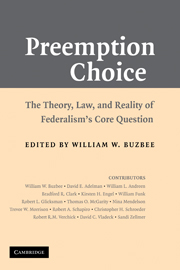Book contents
- Frontmatter
- Contents
- Contributors
- Acknowledgments
- Introduction
- Part I FEDERALISM THEORY, HISTORY, AND PREEMPTION VARIABLES
- Part II THE LAYERED GOVERNMENT NORM
- Part III JUDICIAL TREATMENT AND INTERPRETIVE CHOICE
- 6 Supreme Court Preemption Doctrine
- 7 When Congress Goes Unheard: Savings Clauses' Rocky Judicial Reception
- 8 Federal Preemption by Inaction
- 9 Process-Based Preemption
- 10 Preemption by Federal Agency Action
- Part IV PREEMPTION TALES FROM THE FIELD
- Index
7 - When Congress Goes Unheard: Savings Clauses' Rocky Judicial Reception
Published online by Cambridge University Press: 07 July 2009
- Frontmatter
- Contents
- Contributors
- Acknowledgments
- Introduction
- Part I FEDERALISM THEORY, HISTORY, AND PREEMPTION VARIABLES
- Part II THE LAYERED GOVERNMENT NORM
- Part III JUDICIAL TREATMENT AND INTERPRETIVE CHOICE
- 6 Supreme Court Preemption Doctrine
- 7 When Congress Goes Unheard: Savings Clauses' Rocky Judicial Reception
- 8 Federal Preemption by Inaction
- 9 Process-Based Preemption
- 10 Preemption by Federal Agency Action
- Part IV PREEMPTION TALES FROM THE FIELD
- Index
Summary
INTRODUCTION
As shown in other chapters of this book, the preemption doctrine has been applied inconsistently by the courts, and, in many cases, the results have failed to promote either federal-state comity or institutional competence. Preemption is particularly troublesome when Congress has included a savings clause in the federal statute at issue.
Many, if not most, federal public health and environmental statutes include broadly crafted savings clauses intended to leave ample room for state law to provide increased protection beyond the federal regulatory floor. Recent Supreme Court cases reveal a pattern of hostility toward savings clauses in cases involving state regulatory programs. In contrast, although the Court's reception of savings clauses for common law tort claims has been unpredictable, by and large tort claims have been treated more favorably. The inclusion of generously worded savings clauses governing state tort claims may explain these results in some contexts, but the text of most savings clauses is so similar that, as the Supreme Court has noted, not even the “most dedicated hair-splitter” could distinguish them. Instead, the Court apparently views positive enactments and formal regulatory programs issued by state legislatures and state agencies as a greater threat to the implementation of federal programs and the accomplishment of federal goals than tort claims.
- Type
- Chapter
- Information
- Preemption ChoiceThe Theory, Law, and Reality of Federalism's Core Question, pp. 144 - 166Publisher: Cambridge University PressPrint publication year: 2008



